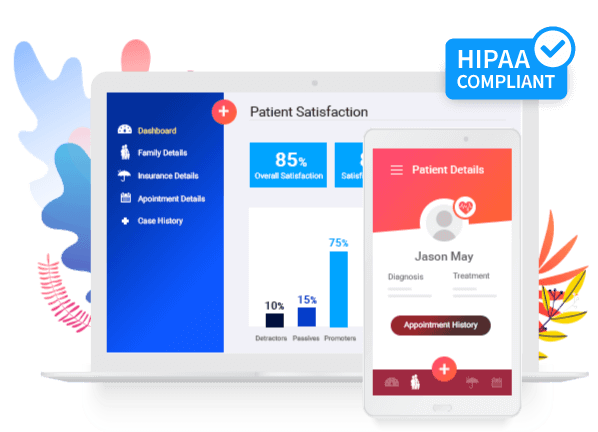Hippocrates said, “wherever the art of medicine is loved, there is also a love of humanity.” It is well-accepted and followed by almost all healthcare officials.
But, it makes me wonder when people differentiate between healthcare organizations and term it good or bad. Healthcare is one of the noblest, and most challenging professions in the world. So, is it the healthcare staff that is questionable, or the patient engagement and management that is bad?
People rely on healthcare providers at the most difficult times in their lives and the most important factor to foster a good Doctor-Patient relationship is to be available. This holds true not just for healthcare but for any business.
Strong customer relationships are much like any relationship. You need to invest your time to build and nurture them over a period. 79% of customers say that they rely on brands who understand and care about them before investing in them. Businesses that perceive the importance of building customer relationships develop an emotional connection towards them and retain with them for a long time.
However, a lot of times the availability, understanding, and care is missing because of overburdened and exhausted staff. Given the severity of the situation, this can have a very serious impact on the reputation of the organization.
Now, this is where a CRM comes into the picture. CRM in healthcare industry is gaining popularity as it helps you maintain a healthy relationship with patients.
What is Healthcare CRM?
A healthcare CRM is a patient relationship management tool designed specifically for use by healthcare organizations. Healthcare CRMs closely knits multiple sources of data together (consumer and patient demographics, social, behavioral, financial, website, call center, provider credentials, etc.) to provide a comprehensive view of patient habits and activities.
The primary goal of a healthcare CRM system is to engage, acquire, and retain patients. It serves as an essential tool to manage your patients from even before they visit your hospital to post-treatment and beyond.
Just to give you a clearer understanding,
Assume a patient makes an inquiry with your call center team about a full body checkup. Now, the treatment has certain prerequisites
Before the first appointment, healthcare CRM will automatically send them the prerequisites they must adhere to.
Following that, your team would be reminded to call and check the condition of the patient personally. It helps the hospital initiate a relationship, and gain the trust of your patients.
After the first appointment, smart healthcare CRM can send automated emails with details of their primary therapy. In the email, you can also provide them the do’s and don’t in the course of treatment. You can suggest appropriate eating habits and other such tips. This enables you to maintain communication and develop a relationship with the patient even outside the hospital. It shows that your hospital cares.
Here are a few things you should be able to do with a Healthcare CRM.
CRM in Healthcare Industry: 12 Significant Benefits
#1. Build a 360-Degree Patient Profile
We all know about the iconic brand Apple and its CEO, Steve Jobs who said, “Get closer than ever to your customers. So close that you need to tell them what they need well before they realize it themselves.”
Through a CRM, you would grow closer to your patients, by weaving information together from multiple data sources. Access patient demographics, social profiles, behavioral data (activity tracking, conversation tracking – phone calls, emails, text messages & walk-ins), medical & appointment history (supplied by them, and by fetching from your other tools).
This helps personalize and connect with your customers via email, text, remarketing campaigns, phone calls, and more.
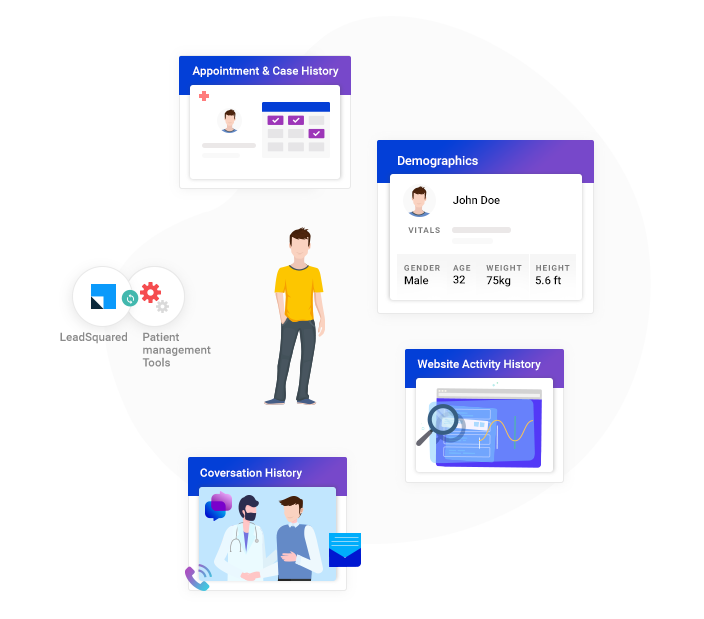
#2. Capture Inquiries and Segment Them Intelligently
To connect with your patients, you need to engage with them on a personal level. You should be able to distribute all incoming appointment requests and other inquiries based on their locations, conditions, physicians, preferences, past diagnoses, language, a specific ailment, etc. The first step to relationship building is personalizing according to your customer’s requirement.
Well, personalized communication is surely important but time is more precious when it comes to the healthcare sector. It is the need of the hour to reduce wait times (in all interactions) and periods of ambiguity. A smart healthcare CRM would help you achieve this by connecting your patients to the right doctor instantly. This is one of the best benefits of CRM in healthcare industry.
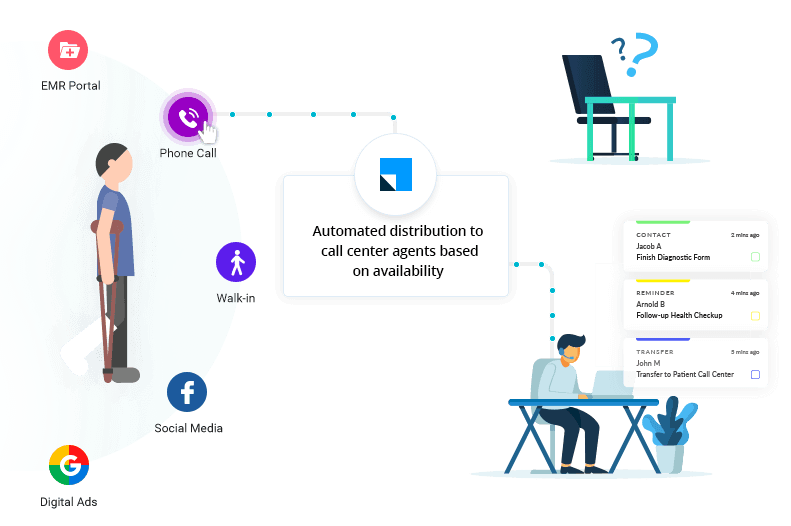
#3. Organize Family Members As a Unit
Did you know that family medical history is the strongest factor to identify people with a higher-than-usual chance of having common disorders, such as heart disease, high blood pressure, stroke, certain cancers, and diabetes? These complex disorders are influenced by a combination of genetic factors, environmental conditions, and lifestyle choices.
With an intelligent healthcare CRM, you can club the members of one family together as a unit, with account management. This would help you keep track of patients’ history with your hospital, their family history of hereditary conditions, the appointment history of all the family members, and accordingly offer relevant health tips, loyalty points, and rewards.
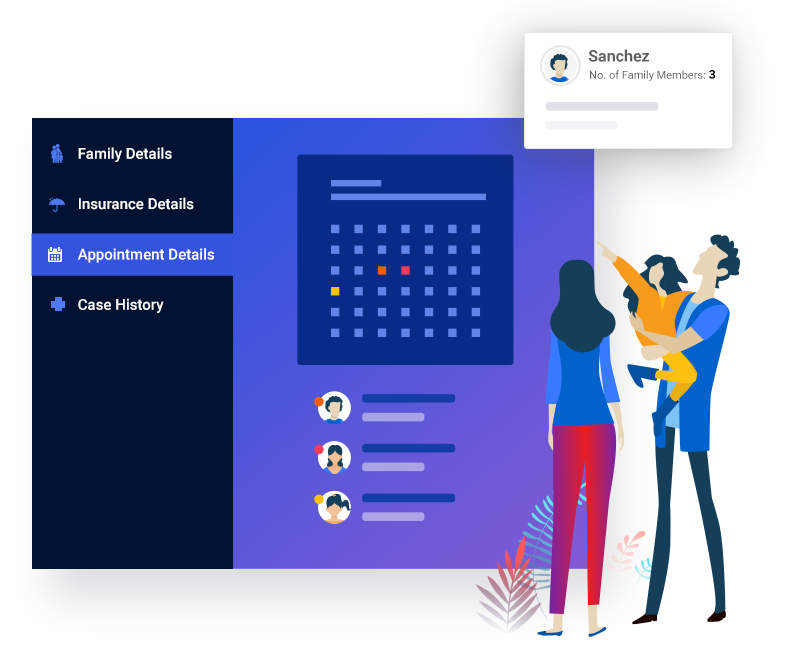
#4. Maintain Personalized Communication
Patients reach out to a healthcare organization with a belief to get a solution to their ailment. But when we talk about a large number of patient inquiries on a daily basis, providing personalized attention to everyone is challenging. Tracking patient’s activities, their ailment, and many other parameters are beyond the scope of an excel sheet.
That’s where Healthcare CRM comes into play. It helps track every patient by providing a clear view of the entire patient’s journey right from the time their inquiry was registered.
Not only do patients want complete visibility into their healthcare history, but expect hospital communication to reflect it as well. You can personalize your emails and texts containing prescriptions, phone calls, precaution, and reports through CRM. It can help you humanize your hospital, and build positive patient relationships by engaging them consistently.
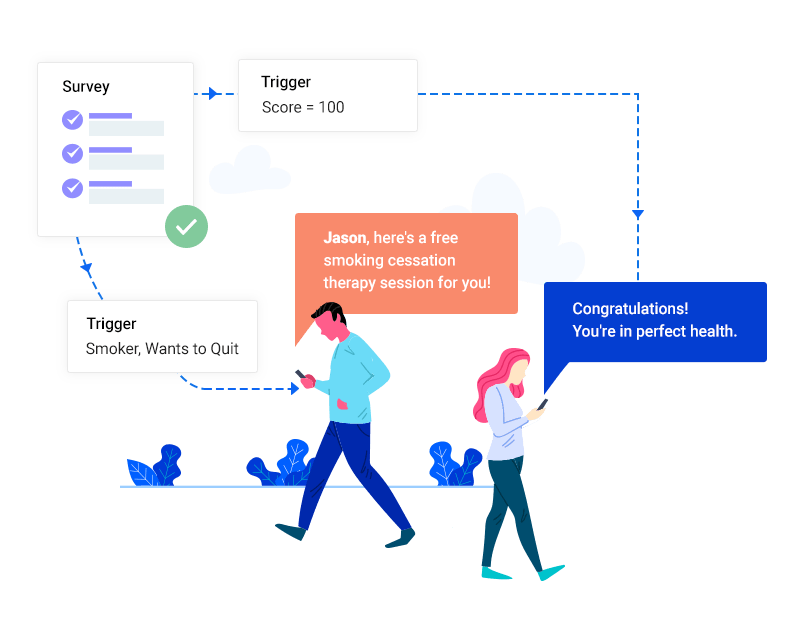
#5. Provide a Hassle-Free Medical Experience
When you repeat call your patient, to book an appointment, You need to have their detailed history such as prior treatment, previous doctor, family history, medication history, etc. A proper tab on the previous medication can give the doctors an idea of future prescriptions.
For example, if a patient is a diabetic and has come for a full body check-up, It would be really beneficial to know the past medication and treatments the doctor has prescribed so that they get an idea of whether to increase the dosage or change medication. The CRM for the healthcare industry caters to such requirements.
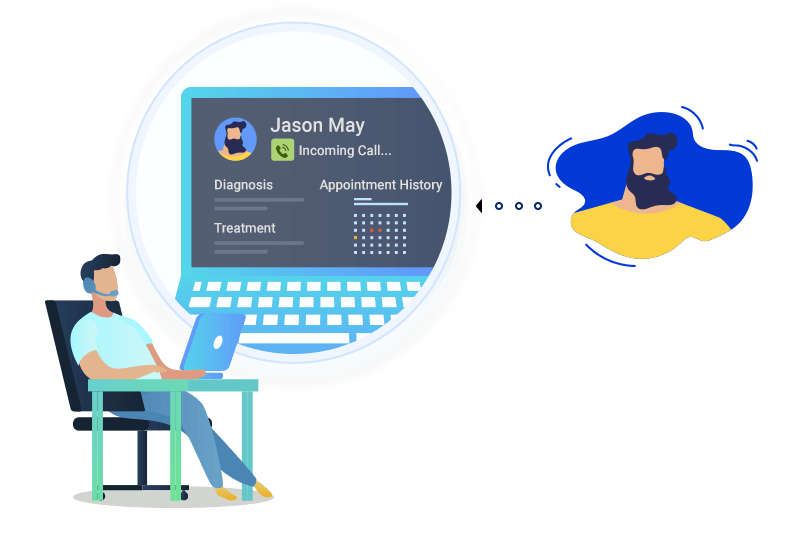
#6. Predict Patient Requirements
You should be able to predict what your patients might need based on their activities, medical & family history, and related conditions, and deliver exactly what they expect. This would help in patient retention, by helping them take steps to curb preventable conditions even before they emerge. Proactive management of health conditions helps foster better patient relationships.
You could further send automated emails and SMS related to their medication and health. This would show that your organization cares about their patients and this would build brand loyalty.
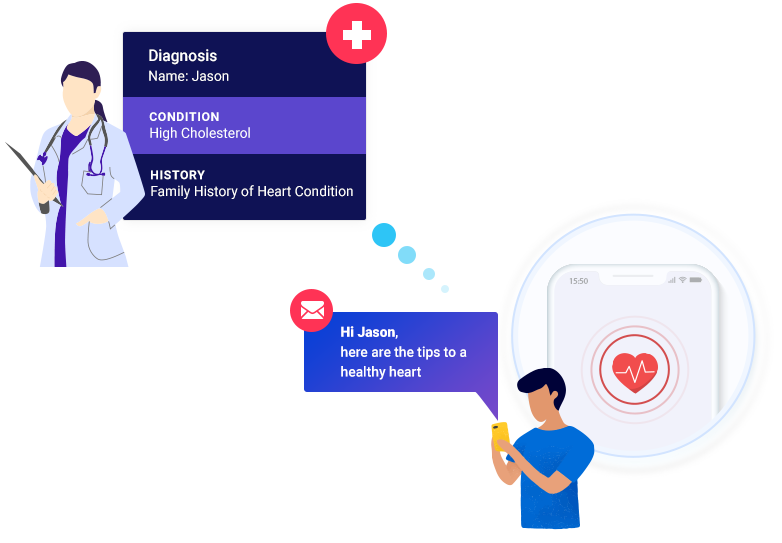
#7. Automate Appointment Bookings
You should be able to book appointments without a hassle. You can even automate appointments on the basis of:
- Clinic location
- Treatment required
- Doctor’s expertise
- Patient preferences.
You should also be able to sync appointments making appointment planning easy for both the doctor and care manager. Notification to the doctors and care managers can be sent in case of any changes or cancellations to ensure timely action.
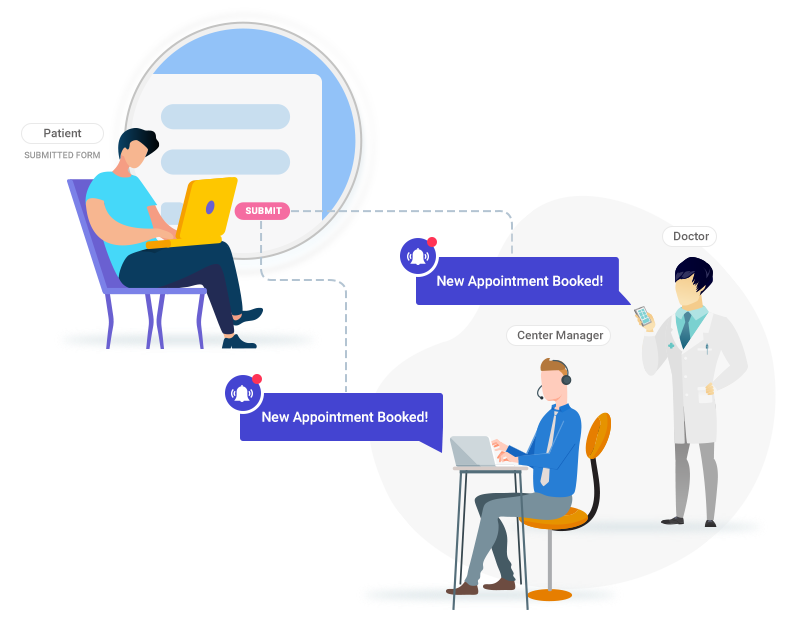
#8. Connect Patients and Doctors Fast and Seamlessly
When was the last time, you booked an Uber and waited 15 minutes for it to arrive? My take would be never. And, why is that?
Well, its because people do not want to wait for so long anymore when they have a quicker alternative. They would rather save time, right?
The same applies in the healthcare sector, only here every minute counts (literally). But, with a Healthcare CRM, you should be able to route patients to doctors of their choice or the ones that best fit their requirements in terms of specialty, location, doctor availability, medical history, and any parameter you feel fit.
The distribution happens automatically as soon as the patient inquiry comes in, You can route the calls to your call center agents based on language, urgency, previous diagnoses, etc. This will save your care managers’ time and ensure a faster patient response.
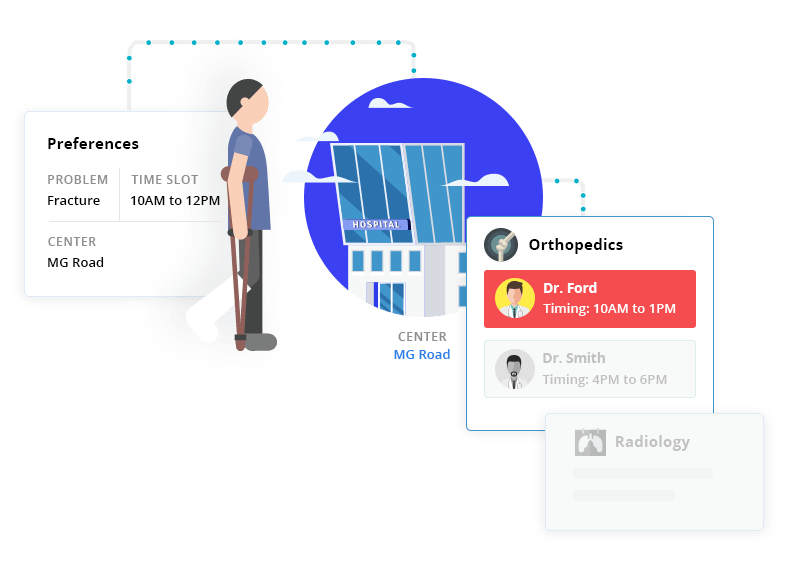
#9. Automate Patient Feedback Collection
The most important part of any business is collecting feedback for self-improvement. With healthcare CRM, you would be able to automate the process of patient feedback collection post-appointments.
This would help you assess the quality of your service, doctors, and facilities and also win back dissatisfied patients. You could further automate the process by emailing or texting them to fill out the feedback and rating form.
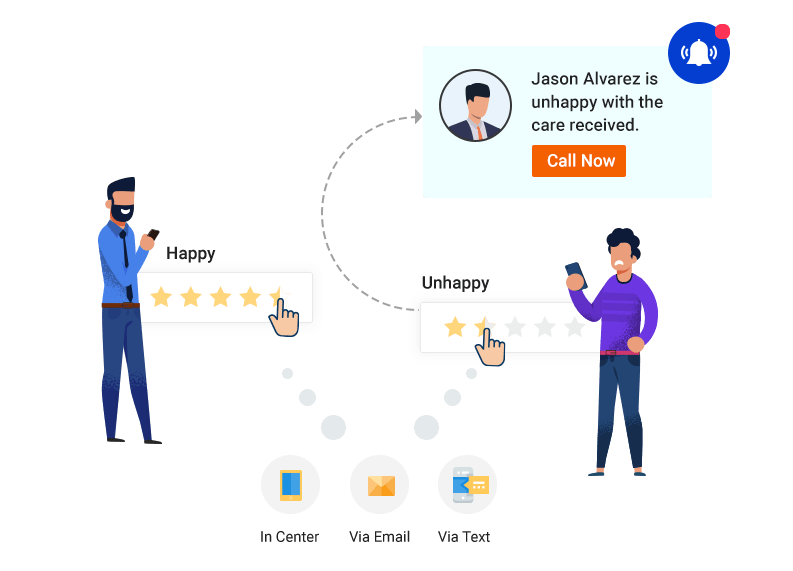
#10. Reduce Error with an Intelligent Healthcare CRM
Can you imagine a slight manual error or miscommunication in the healthcare segment? This would not only tarnish your public image but also leave a negative impact on patients and their families.
Automating the process of exchanging information from other caregiving tools to ensure no communication is based on outdated information is possible with a Healthcare CRM.
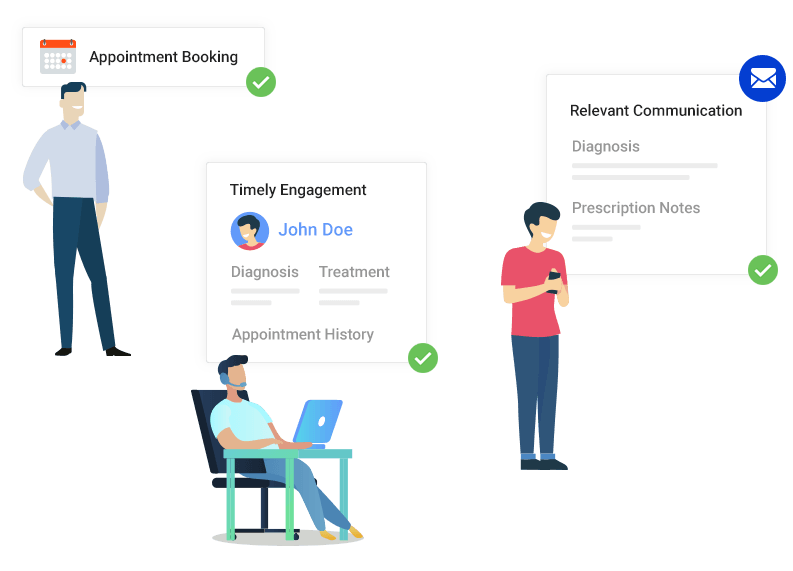
#11. Enhance your Patient Experience
With an automated system, you can run your organization uninterrupted without any hiccups. Ensure minimal or no wait-time, no last-minute appointment cancels, thereby ensuring high-quality patient experience.
Keep complete transparency and notify your patients instantly whenever a doctor’s calendar is updated to avoid confusion. You can further send prescriptions and reports via email or SMS. The CRM for healthcare industry makes these tasks easy for you.
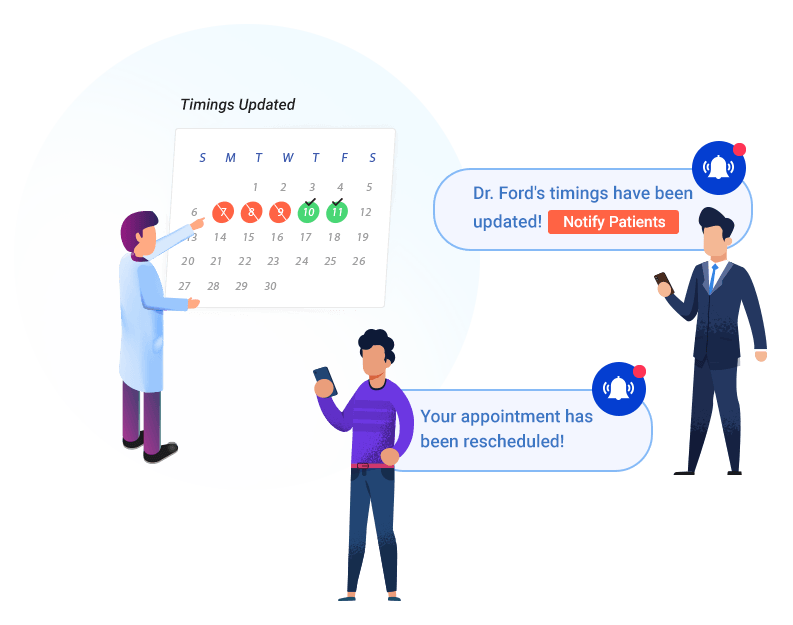
#12. Improve your Hospital’s Bottom-Line with Actionable Reports
You should be able to reduce patient acquisition costs and increase operational efficiency by generating reports on revenue attribution through:
- Campaigns by sales teams, departments, and doctors
- Team efficiency reports for agents and departments
- Patient satisfaction reports
With a solid patient management tool, you can also keep a track of the leads and their status, making subsequent follow-ups easier. An integrated system with a mobile app, email & SMS automation, location tracking, sales automation, and real-time analytics would help increase the lead to customer ratio and team productivity by a large margin.
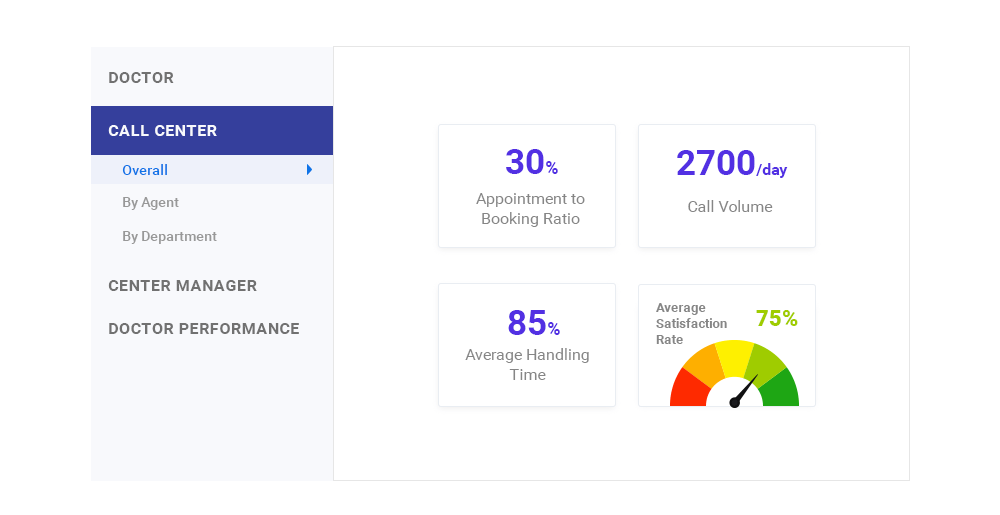
In Conclusion
CRM in healthcare industry: Running a healthcare organization itself is a very noble initiative vested with a lot of responsibilities. Unlike other sectors, the healthcare sector demands you to provide great service which your patients will never forget.
Thus, having a patient-centric healthcare CRM which resonates with your organization’s vision is very important.
If you plan to Enhance patient experience and retain more patients using a HIPAA compliant CRM do check out LeadSquared.
Healthcare FAQs
A customer relationship management solution for healthcare organizations helps streamline patient management and the entire end to end experience. Everything from patient inquiry management to nurturing emails after the patient’s visit to the healthcare center is handled by a CRM. It is considered very important to have a CRM with proper security compliance such as HIPAA.
It is very important to smoothen the customer journey right from the time their inquiry to a particular healthcare organization to the time they get cured and beyond. Patient referrals are one of the most important ways of creating a brand image for a healthcare organization and a healthcare CRM helps map out the patient journey and experience.
Safeguarding patient data in health research is vital as the healthcare industry requires collecting and storing highly confidential and personal information about the health and wellbeing of any patient, which otherwise can be used against any person. If an organization is using a healthcare CRM, they need to ensure that it is highly secure.







